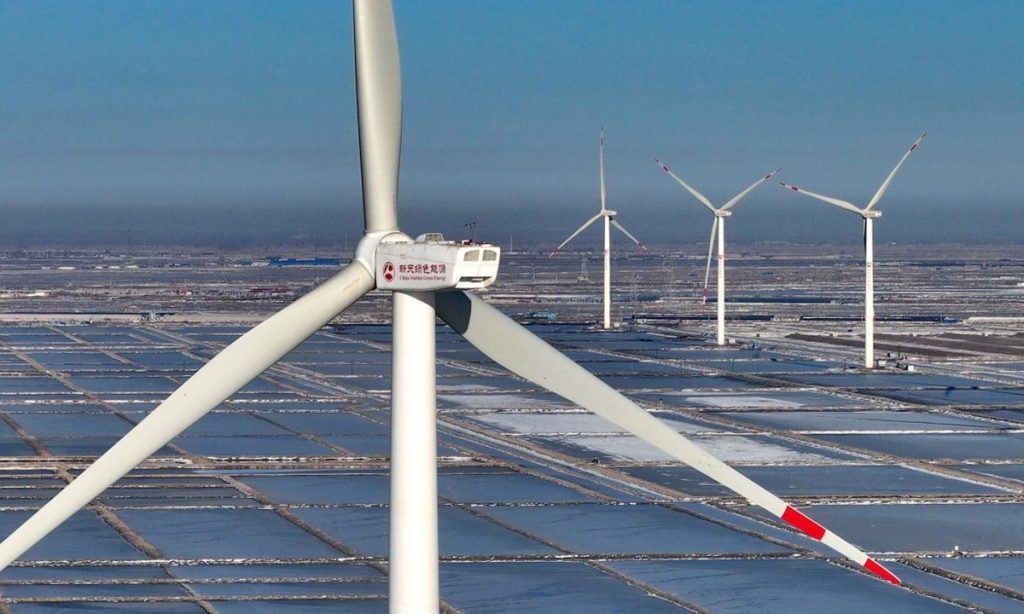Australia to suspend anti-dumping measures against Chinese wind towers in ‘positive signs’ for resolving other trade disputes with China

Chinese experts said on Monday that Australia's move to suspend anti-dumping tariffs targeting wind towers from China is in line with Australia's green development, and is also a "good gesture" by the Australian side ahead of a visit by Chinese Foreign Minister Wang Yi.
Australia announced it would suspend trade remedy measures against China's wind towers when the current measures expire on April 16, 2024, according to a notice released by Australia's Department of Industry, Science and Resources on Friday.
The notice, signed by Australian Minister for Industry and Science Ed Husic, said that the Anti-Dumping Commission has completed an inquiry into whether the continuation of anti-dumping measures applying to certain utility scale wind towers exported from China is justified. The inquiry commenced on May 12, 2023, and the measures are in the form of a dumping duty notice applying to all exporters from China except Shanghai Taisheng Wind Power Equipment Co.
Wind towers are used to create cross ventilation and cooling in buildings.
The anti-dumping measures targeting wind towers have not only affected normal operation and business diversification for Chinese businesses, but have also increased the cost for Australia to optimize its energy structure amid its energy transition, Zhou Mi, a senior research fellow at the Chinese Academy of International Trade and Economic Cooperation, told the Global Times on Monday.
Zhou added that the move is in line with Australia's need for development, noting that the termination also released a positive signal for promoting economic and trade recovery.
This is a good gesture by the Australian side amid Wang's visit, Zhou Fangyin, professor at the Guangdong Research Institute for International Strategies, told the Global Times on Monday. The professor also noted that China is conducting a review of anti-dumping and countervailing duties on Australian wine and may eventually cancel those duties.
Zhou Mi said that both Australia and China have been reviewing the cases and making decisions under the WTO framework.
Zhou Fangyin said Wang's visit will help cement the achievements of bilateral relations by reducing impediments, although few new cooperation projects are in sight.
"Many Australian products such as beef, lobster and barley are of good quality and they are competitive in the Chinese market. However, the previous Australian government's provocative behavior put off many Chinese consumers," Zhou Fangyin said.
He said Canberra should figure out where its own interests lie and stop following the US' anti-China policies too closely. "By doing that, China-Australia relations are expected to maintain stable development," he said.
Wang is paying an official visit to New Zealand and Australia from Sunday to Thursday, China's Foreign Ministry announced previously. Australian companies have expressed high hopes for Wang's visit to Australia with the Global Times in recent interviews, saying that they hope to expand their presence in the Chinese market and strengthen mutually beneficial economic and trade cooperation with their Chinese partners.
As for the much-watched anti-dumping and countervailing duties on Australian wine, the Chinese Ministry of Commerce (MOFCOM) said on March 14 that China will make a final review ruling in accordance with the investigation procedures.
Last week, the ministry disclosed the basic facts regarding the ruling, and gave all parties an opportunity to express their opinions.
China and Australia reached a consensus on resolving their disputes on wine and wind towers properly under the WTO framework, MOFCOM announced in October 2023. The two countries have conducted friendly consultations under the WTO framework governing areas that are of mutual concern, and they have reached consensus on properly resolving them, a MOFCOM spokesperson said in a statement published in October.
Australia's Anti-Dumping Commission in October already proposed to recommend that the anti-dumping measures on wind towers exported to Australia from China expire on April 16, 2024.